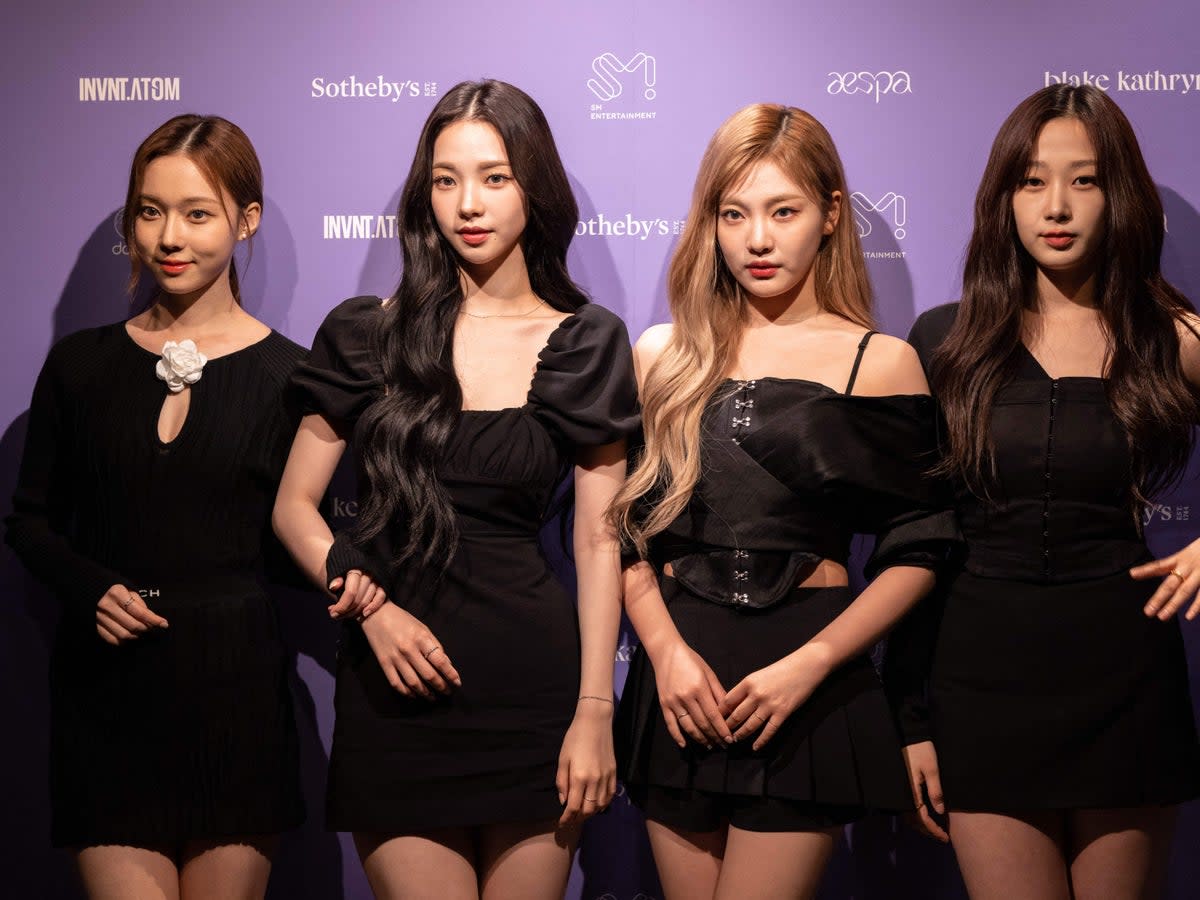Voices: I work on K-Pop’s greatest hits – I know why fans are so out of control over Karina’s ‘boyfriend’

- Oops!Something went wrong.Please try again later.
K-pop artists are a representation of perfection. Bands are usually formed over a rigorous audition process – with exceptionally high standards – with the intent of manufacturing the next “big thing”. It used to be a niche subculture – not anymore. Today, K-pop is a global phenomenon.
Last year, four out of 10 of the top 10 best-selling international acts came from South Korea. That means bands like BTS are right up there, alongside Taylor Swift. Which brings us to the outcry over Karina...
One of K-pop’s biggest stars and a member of the girlband Aespa, 23-year-old Karina has been forced to apologise to her fans because she – wait for it – has a boyfriend.
Incensed admirers accused the 23-year-old of betraying them after they found out she was dating actor Lee Jae-wook. Some of her followers even drove a truck with an electronic billboard to the star’s agency. “Is the love given to you by your fans not enough?” read one of the messages. “Why did you choose to betray the fans? Please apologize directly. Otherwise, you will see a decrease in album sales and empty concert seats.”
Now, extreme behaviour bordering on initimidation is never okay. It must be particularly troubling for such young women. But allow me to give a little context from my experience of being involved in the world of K-pop as an award-winning songwriter: devotees of girlbands like Aespa are extremely loyal. They feel a deep sense of emotional connection to the artists they admire, which to them (most of them...) is something very pure and real.
Social media plays a huge part in revealing so much of the artist’s everyday life that the fans feel they know them, on a really personal level. It can be innocent, but it can also be unhealthy – and for some fans it becomes a sort of distorted reality, bordering on obsession. Most of the K-pop fans I’ve had the pleasure to meet over the years are lovely and supportive of their idols, but there is always a minority who take their fandom to the extreme.
My own journey into the world of K-pop happened by accident: I had one of my songs cut in China, which led me to a meeting at Puk studios – where I was introduced to K-pop. I realised I had a knack for it and absolutely loved it. I have now accumulated over 20 number ones, won music awards – and songs I have written have accrued millions of views on YouTube.
K-pop is more than just music. It’s a fantasy world of colour, fashion, choreography and where dreams come true. This is why so many young boys and girls flock to auditions to live the dream, perhaps without realising its demands. The “dream” supersedes everything. K-pop takes people out of their everyday ordinary lives and into a realm of possibility – and this also refers to the fans.
Aespa, a K-pop girlband renowned for its metaverse concept, have a fanbase known as MY, which means “The most precious friend” in KWANGYA. KWANGYA is the virtual world where the Aespa Avatars live. “Most precious friend” are words MY don’t take for granted.
So, when Karina went public with her romantic relationship, some of the fans were in uproar and accused her of betrayal. They saw it as a huge disloyalty. And Karina may even have been forced to made a public apology at the request of her record label.
It’s always been a well known thing in the music industry – not just in South Korea, but globally too – that management or labels advise artists to remain “single” and “attainable”, so fans believe they have a chance to be with the artist romantically. They feel it makes a difference from a financial standpoint, as the fan buys into the artist – not just the music. In my opinion, Aespa’s PR team would have acted immediately in regards to damage control, especially after threats to boycott concerts and not buy future albums.
K-pop artists are often lovingly referred to as “idols” by their fans, because of the great admiration they feel for them (it’s no surprise that the word “idol” in itself means “something you worship”). Some K-Pop fans are die-hard fans and they don’t want change. They want things to stay just as they are, so Karina’s new relationship was always going to upset the balance and come between the performer-fan “relationship”.
Some of the MY community believe that the only romantic relationship Karina is entitled to is with them.
Her apology, though, was heartbreaking in itself. She said she would show “a more mature and hardworking side in future” – but no one should be ashamed to feel love or have to hide it from the world. Sadly, this is the reality for too many young, female K-pop stars.

